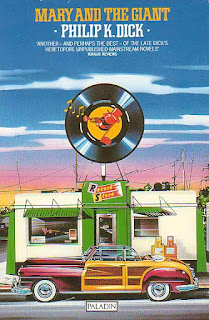Mary and the Giant, by Philip K. Dick, 1988.
Mary and the Giant is one of Philip K. Dick's nine surviving mainstream or realist novels. These were written in the 1950s but for the most part not published until after his death in 1982, Dick's other 36 novels were science fiction. The mainstream novels are underrated and underread, in my opinion. But usually only those who have exhausted the SF novels will venture on the path less traveled by into obscurer PKD.
Mary and the Giant, like the other mainstream novels, is a realistic evocation of the 1950's, a time as strange, in retrospect, as any we might find in an SF novel--which is sort of the point, really, about why we should read these books. They evoke a sense of mystery and otherness--only here, instead of making the otherness explicit by using SF memes--androids, time travel, dystopias, and the like -- here the otherness stays largely hidden and only hinted at.
The characters here are connected in terms of being in the music scene of a small northern California town. No heroes and heroines here: this is about their relationships, and their errant and fugitive attempts of awkward groping for love with each other in various combinations. The racial and sexual frankness of the book is extraordinary for the time period in which it was written, which may partially account for why it was not published at the time.
The giant of the title, Joseph Schilling, arrives in town to open a classical record shop. His origins are mysterious: "Perhaps he had come all across the world; perhaps he had always been coming, moving along, from place to place....He was so immense that he towered over everything." This mythic description introduces a note of fantasy into the drab small town setting.
Mary Anne Reynolds (of the title) is a very confused young woman who bats around ceaselessly from lover to lover, apartment to apartment, job to job. Joseph briefly becomes her employer and would-be sugar daddy. Although he appreciates her as a free spirit, the match is hopeless because of her headstrong and dilatory nature. Also, because she was sexually abused by her father, an older man like Joseph cannot be other than toxic to her.
Joseph is mysteriously drawn to her,like to a femme fatale, despite his better judgment. She eventually finds happiness with a younger musician, but in the ironic ending, Joseph does not.
How do you solve a problem like Mary if you are Joseph? You don't; the answers stay hidden. He understands that she is trying to fit into a world that has not come into being yet; that may not exist for a hundred years. Her indecisiveness can thus be explained by the fact that she is trying to inhabit a different reality, as was Dick himself.
Music was an article of faith for Dick. His inclusion of it here as a constant background gives us the author's witnessing presence, presiding over the eternal accompaniment to the dance of the wandering humans.

No comments:
Post a Comment